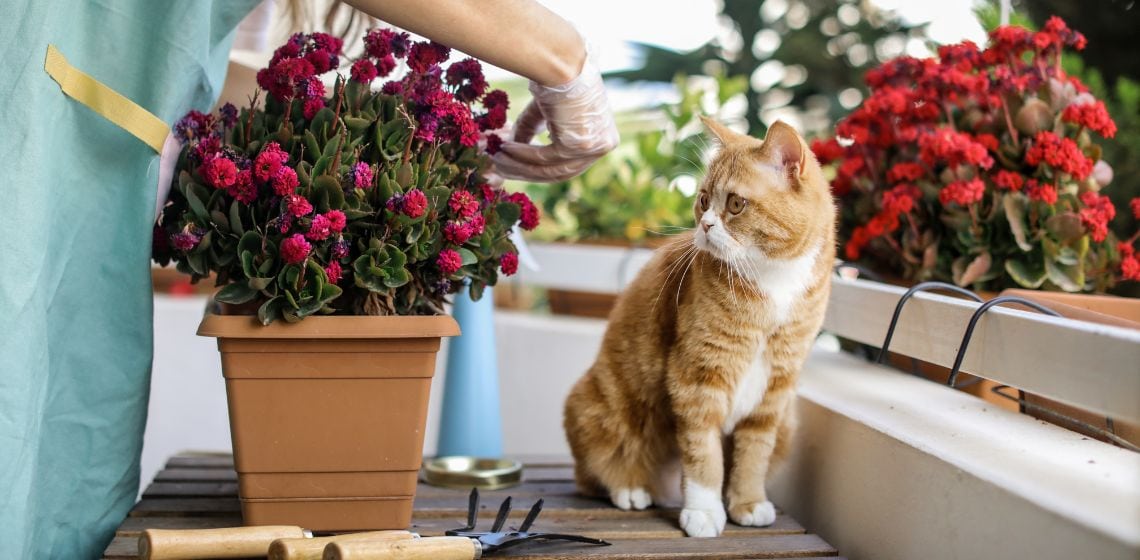Table of Contents
Dangerous Plants
It wouldn’t be spring without beautiful, blossoming plant life. Colorful flowers and vibrant greenery bring a breath of fresh air after the long, dull winter months. Gardening is an extremely popular spring activity for obvious reasons.
Before planting some flowers or bringing plants into your home, it’s important to take the time to research the plants you are looking to buy as many of them can be toxic to your dog or cat. Some plants can cause mild symptoms such as vomiting and diarrhea, while others can cause organ failure and be fatal.
Some common poisonous plants include:
- Lilies
- Azaleas
- Tulips
- Daffodils
- Hemlock
- Ivy
- Eucalyptus
If you’re ever unsure about the risk associated with certain plants, your veterinarian will be happy to discuss what can and can’t be included in your pet-friendly spring garden.
Beware Of Ticks
Your pets aren’t the only ones eager to come out of hibernation. Mild weather prompts ticks to emerge from their dormant stage and start looking for a host to latch onto. These pesky parasites not only make your skin crawl, but they can transmit several infectious diseases to your dogs and cats. Lyme, Ehrlichiosis, Anaplasmosis, and Rocky Mountain Spotted Fever are all examples of diseases that pose a risk to your pet.
Tick-borne illnesses are much more prevalent in dogs, but our feline friends are not completely immune to contracting an infection. Keeping your pets on a preventative that includes ticks is essential to keeping them protected once these creatures start to make an appearance.
Watch Out For Mosquitoes
Much like ticks, once temperatures stay consistently above 50°F, these troublesome insects seem to invade and put a damper on enjoying the outdoors. If buzzing in our ears and making us itchy wasn’t bad enough, mosquitoes are the main transporter of heartworm disease. As the name implies, this condition involves these parasitic worms that invade the heart, lungs, and blood vessels of our beloved pets.
Dogs are especially at risk as their bodies are the ideal host for these worms. Cats are not the ideal host, however, they are still susceptible to contracting this disease. If they’re not already, spring is the perfect time to start your pets on heartworm prevention to keep them safe from this potentially fatal disease.
Stay Away From Antifreeze
Many people use the change in the season to do annual maintenance on their vehicles. Antifreeze, also known as engine coolant, is used in cars, trucks, buses, and tractors to keep engines from freezing in the winter and overheating in the summer. Unfortunately, a main component of antifreeze, ethylene glycol, is extremely toxic to both animals and humans. This chemical agent has a very sweet taste which can attract your dog or cat to ingest it. Even as little as a teaspoon can be fatal for your furry family member.
Antifreeze poisoning begins with vomiting, seizures, excessive urination, and lethargy. Kidney failure and death can occur within 72 hours if your pet doesn’t seek medical attention. Thankfully, animal-friendly alternatives are becoming more available by replacing this deadly chemical and adding a bittering flavor to try and deter pets. If you’re planning on working on your car this spring, be vigilant in checking for any leaking fluid and keep your pets out of the area.
Mind Easter Festivities
Easter can be seen as the official kickoff of the spring season. While this holiday is a time for many families to enjoy spending time together, it’s important to be mindful of the potential hazards that come with the celebration. Chocolate candy is extremely popular during this time. Many pets want to try it out for themselves and may try and sneak into the Easter basket for a taste.
Unfortunately, chocolate can be fatally toxic to both cats and dogs. It’s good practice to keep all Easter treats out of reach of your pets to prevent them from ingesting something harmful. Decorations can also pose a risk. Dogs and cats may be tempted to chew on the colorful, plastic grass used in Easter baskets and other decor. If enough is ingested, this can cause a bowel obstruction. This occurs when foreign material cannot pass through the stomach or intestines, potentially causing some serious complications such as vomiting, diarrhea, dehydration, and lethargy.
Our pets will agree, we are all eager to ring in the spring season. Being diligent and aware of potential hazards to your pet will give you peace of mind and allow you to enjoy all of what spring has to offer.

Emily is a veterinary technician with over 6 years of experience in the field. She knew since she was a child that she was meant to work with animals. She started her career working in veterinary ophthalmology and has since worked her way to general practice. Emily now works as a surgical technician working in the operating room. When not at work, Emily spends her time with her husband and her small zoo of 3 dogs, 4 cats, 5 ducks, and 5 chickens.








